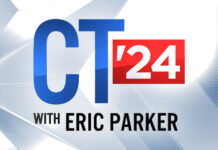
Much of what we will inevitably focus on here at The Laurel is the rise of the New Media in Connecticut. That is, the glacial move away from traditional print and radio toward a more digital and networked way of gathering and disseminating the news.
I bring this up because one of the recent casualties of the New Media in Connecticut was someone who recognized and embraced it: Colin McEnroe. Yes, Colin still writes columns for the Courant and (until this week) had an AM radio show – two basic forms of Old Media. Yet he also used and investigated many forms of New Media. For example, he is the author of several blogs and even teaches classes at Trinity Collegeon blogging and media.
Colin also utilized the interactivity of New Media. He coordinated an on-air interview with two curators from the Wadsworth Atheneum with an online video of their exhibit. He also learned to use Twitter on the air, educating his listeners on this up and coming technology. These are perfect examples of how he helped bridge the gap between Old and New Media.
The rise of New Media is a significant factor in why print, radio and television news outlets are cutting back. What is frustrating – and almost ironic – is that Colin became a casualty of something he embraced more than most members of Connecticut’s media. However, he has adapted to this New Media which is why he will continue to succeed. Other casualties of this Media Darwinism may not be so lucky.





New media is easy enough to embrace for practicing journalists, and many of us do.
The problem is, no one is safe until the corporate bean counters figure out a way to make money off new media. Big money.
Colin did everything right, and all it got him was an extended vacation. What a shame.
Here’s something to think about New Media:
Just how does it *really* fit into people’s lives?
Go back and read through the nasty comments pointed toward McEnroe, mostly on the Courant web page. How many are from out of state? Especially way out of state? There is no way that WTIC AM radio could be heard in those places in the late afternoon when his show was on, at least not very often.
So, were these people just randomly choosing the WTIC webcast to listen to the difficult to find Rush Limbaugh show and then forgetting to change when McEnroe came on? And were they doing it so often that they had informed an opinion of his show that was so negative?
It would seem to me that something else is going on, and it is only possible with New Media, where everybody with an internet connection has access to the stage. Really understanding that aspect might be very important to understanding the role and place of New Media.